Meaning of Zoar in the Bible: Place of Refuge
Zoar, derived from the Hebrew ‘Tso’ar’ meaning ‘small’ or ‘insignificant,’ holds substantial narrative and theological significance in the Bible. Located near the Dead Sea, Zoar is prominently featured in Genesis as the refuge for Lot and his daughters during the annihilation of Sodom and Gomorrah.
This city’s preservation contrasts with the complete destruction of its neighbors, emphasizing themes of divine mercy and selective judgment. Zoar symbolizes a sanctuary amidst chaos, illustrating the interplay of human agency and divine intervention.
Zoar’s importance extends beyond etymology, enriching its biblical context and reflecting deeper theological insights. Further exploration reveals its multidimensional impact.

Meaning of Zoar in the Bible: Origin, Location, and Spiritual Significance
| Aspect | Details |
|---|---|
| Name | Zoar (also called Bela) |
| Origin | Hebrew – Tso‘ar (צֹעַר) meaning small or insignificant |
| Meaning | Small, little |
| Biblical Reference | Genesis 13:10, Genesis 19:20–23 |
| Notable Event | City where Lot fled during the destruction of Sodom and Gomorrah |
| Symbolism | Refuge, mercy, God’s sparing judgment |
| Spiritual Insight | Represents God’s compassion in the midst of judgment and destruction |
Etymology of Zoar
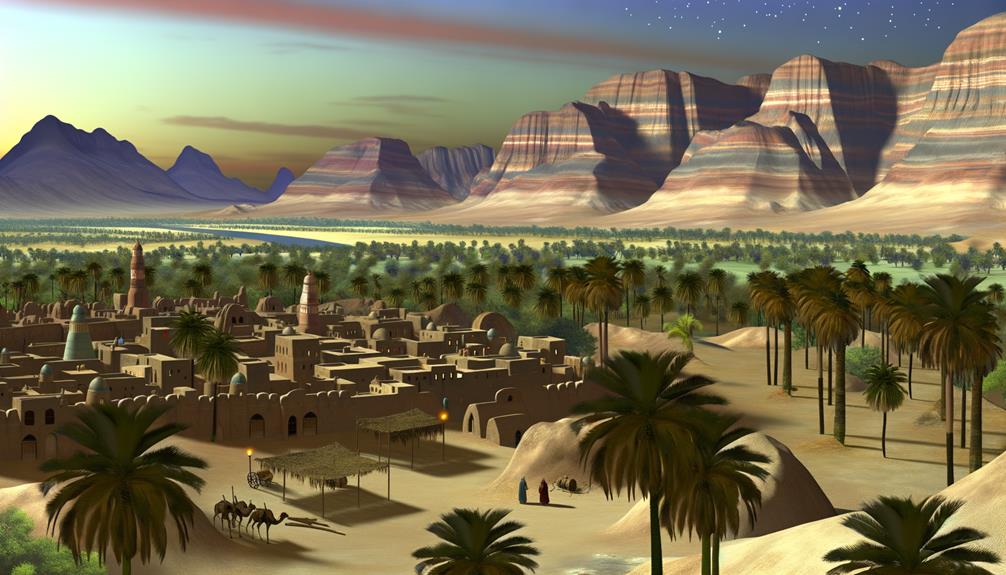
The etymology of Zoar in the Bible reveals its roots in the Hebrew word ‘Tso’ar,’ which translates to ‘small’ or ‘insignificant.’ This nomenclature suggests a diminutive status, reflecting perhaps the town’s size or its perceived importance in a broader geopolitical context.
The term ‘Tso’ar’ is etymologically linked to the root ‘tsa’ar,’ meaning ‘to be small,’ indicating a descriptive, rather than an emblematic, origin. This linguistic choice may also imply a thematic undertone within biblical narratives, where the significance of Zoar often contrasts with larger, more prominent cities.
Understanding this etymology provides critical insight into the socio-cultural and theological dimensions of how ancient Hebrews perceived and narrated their world, revealing layers of meaning in the biblical text.
Zoar in Genesis
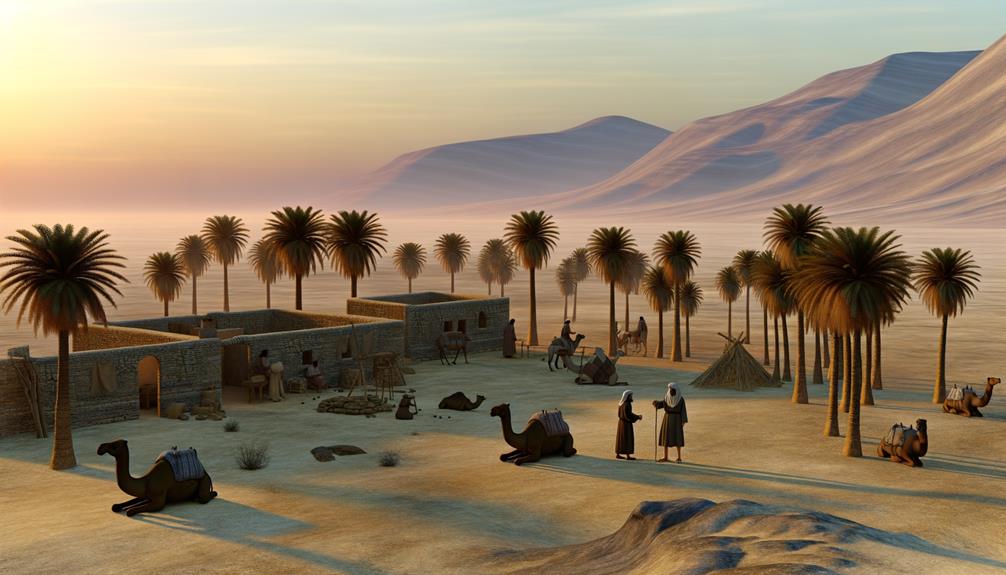
Within the narrative of Genesis, Zoar emerges as a place of refuge during the destruction of Sodom and Gomorrah, providing a critical sanctuary for Lot and his daughters. This small city, whose name translates to “little” or “insignificant,” assumes significant importance within the context of divine judgment and human survival.
Importantly, Zoar’s mention in Genesis 19 underscores several key aspects:
- Divine Mercy: Zoar’s preservation amidst widespread destruction reflects an element of divine compassion.
- Symbol of Hope: The city’s role as a refuge highlights a theme of hope and deliverance.
- Contrast with Sodom: Zoar’s survival juxtaposes starkly with the fate of Sodom and Gomorrah, emphasizing moral and theological lessons.
These elements collectively enrich the narrative’s complexity and theological depth.
Lot’s Escape to Zoar

Lot’s escape to Zoar, marked by the urgency of departure, underscores the immediacy with which divine intervention necessitated action.
The narrative illustrates the divine protection granted to Lot and his family, highlighting Zoar’s role as a refuge amidst impending destruction.
This event not only emphasizes the significance of Zoar as a sanctuary but also reflects broader themes of mercy and judgement within the biblical text.
Urgency of Departure
Amidst the impending destruction of Sodom and Gomorrah, the urgency of departure was starkly underscored by the angels’ directive for Lot and his family to flee immediately to Zoar.
This urgency is emphasized by several critical factors:
- Imminence of Judgment: The angels conveyed that divine judgment was not only inevitable but imminent, leaving no room for delay.
- Absolute Obedience Required: Lot and his family were instructed to not look back or tarry, symbolizing the necessity for complete and unwavering obedience.
- Smallness of Zoar: Lot’s plea for refuge in Zoar, a ‘small’ city, underscores the human element of seeking mercy and safety, reflecting a broader theological narrative of divine compassion in times of judgment.
These elements collectively highlight the critical nature of immediate action in the face of divine decree.
Divine Protection Granted
Divine protection manifested through the granting of refuge in Zoar, underscoring a pivotal moment of God’s mercy in the narrative of Lot’s escape.
As recorded in Genesis 19:20-22, Lot’s plea to flee to this small town, rather than the mountains, highlights a significant intervention by God. This divine concession not only underscores God’s attentiveness to individual pleas but also illustrates His willingness to modify decreed plans for the sake of the righteous.
Significance of Zoar
The significance of Zoar in the context of Lot’s escape is multifaceted, serving as a witness to divine mercy and a critical juncture in biblical history. This small town offered refuge as Sodom and Gomorrah faced divine retribution, emphasizing key theological themes:
- Divine Mercy: Zoar symbolizes God’s willingness to spare even a small remnant from judgment, showcasing His mercy and compassion.
- Human Agency: Lot’s plea to flee to Zoar instead of the mountains demonstrates human agency within divine plans, highlighting a nuanced interplay between divine will and human choice.
- Covenantal Faithfulness: Zoar’s preservation underscores God’s covenantal faithfulness, as He honors the promises made to Abraham by sparing Lot and his family.
These elements underscore Zoar’s enduring theological import.
Zoar and Sodom’s Destruction
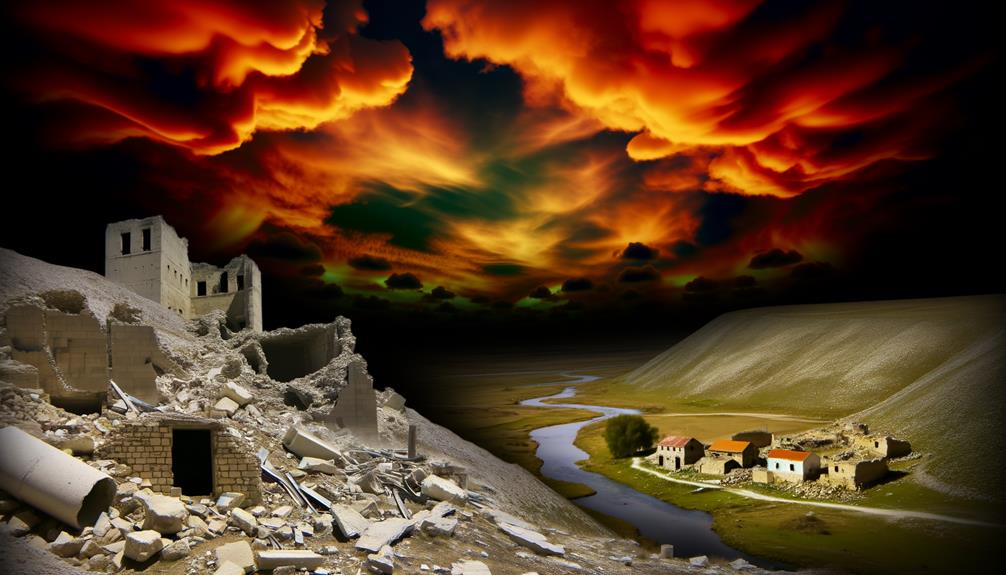
The narrative of Zoar’s preservation amidst Sodom’s destruction provides critical insights into Lot’s escape route and the broader implications of divine judgment.
As Lot fled to Zoar, the city’s survival amidst the catastrophic judgment of Sodom underscores the selective nature of divine mercy.
This juxtaposition invites a deeper examination of the theological and moral dimensions surrounding these events.
Lot’s Escape Route
Lot’s escape route to Zoar, as depicted in the biblical narrative, serves as a critical juncture in the account of Sodom’s destruction. The urgency and divine intervention required for Lot and his family to reach Zoar highlight several key elements:
- Divine Mercy: Zoar becomes a refuge, underscoring God’s willingness to provide sanctuary amidst impending judgment.
- Human Agency: Lot’s negotiation to flee to Zoar instead of the mountains reflects human involvement in the divine plan.
- Symbolic Geography: The choice of Zoar, a small town, contrasts sharply with the grandeur of Sodom, symbolizing humility and survival.
This context enriches our understanding of Zoar’s significance as both a literal and metaphorical place of escape and protection.
Divine Judgment Impact
As Lot and his family sought refuge in Zoar, the catastrophic fate that befell Sodom serves as a stark illustration of divine judgment and its far-reaching implications.
The destruction of Sodom, as depicted in Genesis 19, underscores the severity of moral and ethical transgressions, resulting in total annihilation by fire and brimstone. Zoar, spared from this divine wrath, becomes a symbol of mercy juxtaposed against judgment.
This dichotomy highlights the theological principle that divine judgment is both just and discerning, sparing the righteous while condemning the wicked.
The narrative invites scholars to reflect on the broader implications of divine retribution and its role in biblical theology, emphasizing the balance between justice and mercy within the framework of divine governance.
Historical Context of Zoar
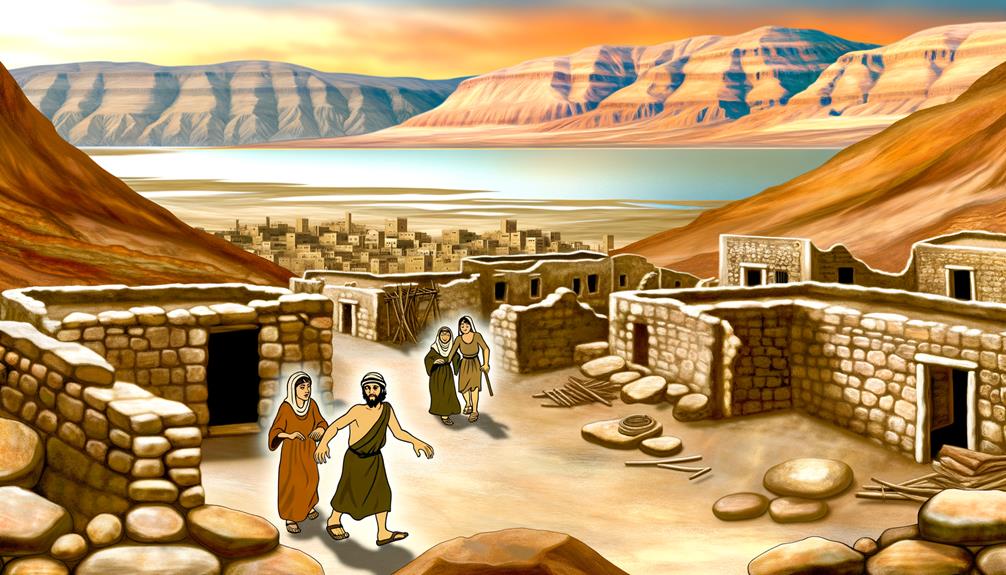
Located near the southern end of the Dead Sea, Zoar held significant importance in biblical narratives and ancient Near Eastern history. This city is frequently referenced in scriptural accounts, indicating its prominence during different epochs.
Zoar’s historical context can be better understood by examining several key aspects:
- Ancient Trade Routes: Zoar was strategically placed along crucial trade routes, serving as a conduit for commerce between Mesopotamia and Egypt.
- Cultural Interactions: The interactions between Zoar and neighboring civilizations facilitated a rich exchange of cultural and technological advancements.
- Military Significance: Due to its strategic location, Zoar was often contested by various empires seeking control over the region, reflecting its geopolitical importance.
These factors collectively underscore Zoar’s multifaceted role in ancient history.
Zoar in Biblical Geography
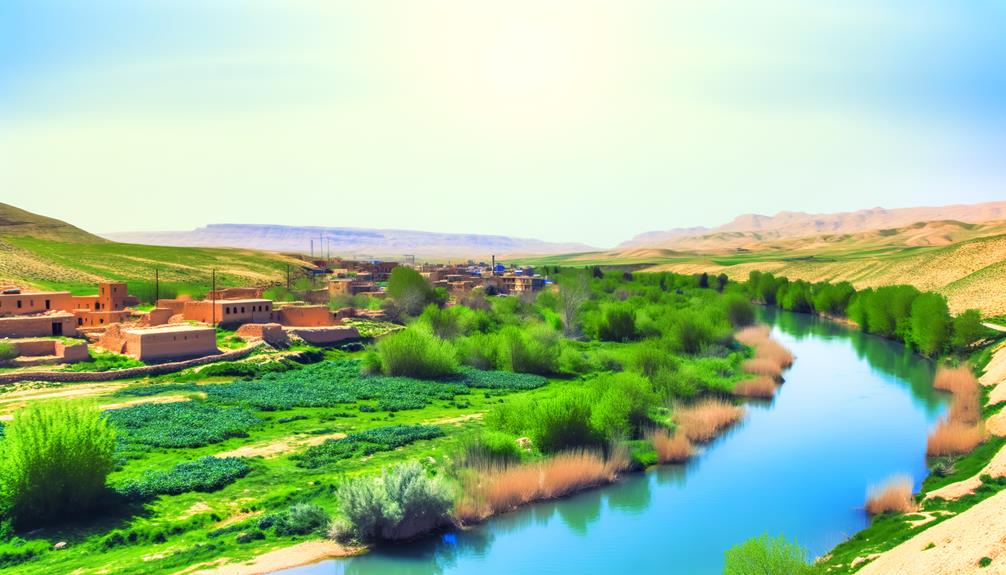
In biblical geography, Zoar emerges as a pivotal landmark, particularly in the narratives surrounding the cities of the plain.
Situated near the southeastern border of the Dead Sea, Zoar is frequently mentioned alongside Sodom, Gomorrah, Admah, and Zeboiim. It is particularly the city to which Lot fled during the divine destruction of Sodom and Gomorrah (Genesis 19:20-23).
The geographical positioning of Zoar is significant, offering a contrasting fate to the obliterated neighboring cities. Historical and archaeological evidence suggests that Zoar’s location provided a sanctuary and a point of survival amidst widespread devastation.
This relatively small city therefore holds considerable importance in biblical topography, illustrating divine mercy and the complexity of ancient Near Eastern urban landscapes.
Symbolism of Zoar
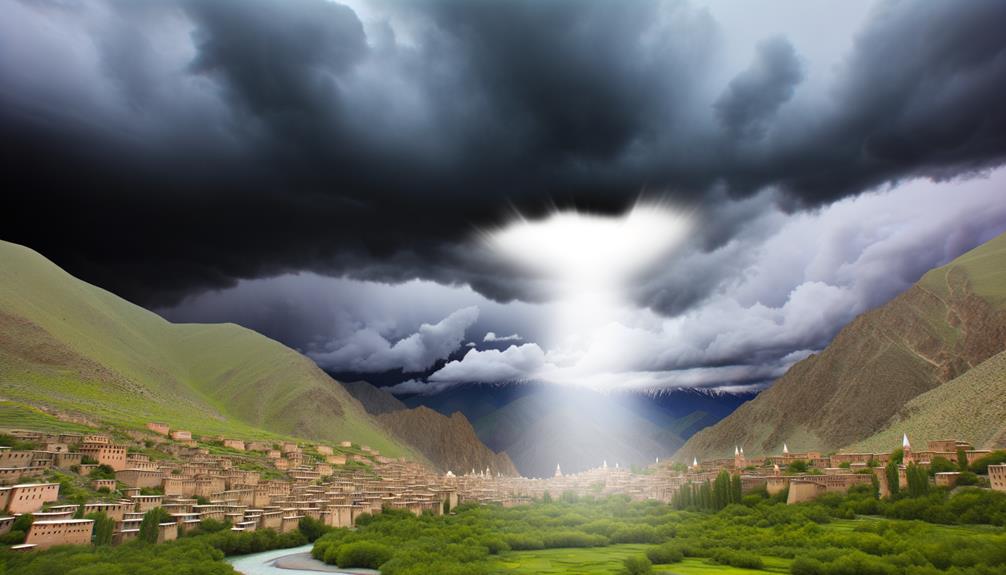
Although often overshadowed by its more infamous neighbors, Zoar occupies a unique position within biblical narratives, embodying themes of refuge, mercy, and divine intervention. This small city, spared from the destruction that befell Sodom and Gomorrah, symbolizes God’s willingness to provide sanctuary even amidst widespread judgment.
To explore deeper into the symbolism of Zoar:
- Refuge: Zoar served as a haven for Lot and his daughters, illustrating the concept of divine protection in times of peril.
- Mercy: The city’s preservation highlights the merciful aspects of God’s nature, offering a contrast to the judgment executed on Sodom and Gomorrah.
- Divine Intervention: Zoar’s role underscores the belief in active divine involvement in human affairs, showcasing God’s capacity to alter destinies.
Lessons From Zoar

The enduring narrative of Zoar imparts significant theological lessons that extend beyond its immediate historical context.
Zoar, spared during the destruction of Sodom and Gomorrah, underscores themes of divine mercy and judgment. It serves as a refuge for Lot, illustrating God’s provision and protection for those who seek righteousness amidst pervasive corruption.
The city’s name, meaning ‘small’ or ‘insignificant,’ symbolizes humility’s importance in receiving divine grace.
Furthermore, Zoar’s preservation juxtaposed against the obliteration of nearby cities emphasizes the consequences of moral decay and the potential for redemption, no matter the scale.
This dichotomy invites deeper reflection on moral responsibility, divine justice, and the profound impact of individual choices within a broader societal framework.
Conclusion
To summarize, Zoar emerges as a multifaceted symbol within biblical narratives, embodying themes of refuge, survival, and divine judgment. Its etymological roots and geographical significance provide a rich tapestry for understanding its role in the stories of Lot and Sodom.
The historical and symbolic dimensions of Zoar offer profound lessons about the interplay between divine mercy and judgment.
Consequently, Zoar stands as an enduring witness to the complexities and nuances of biblical geography and theology.






